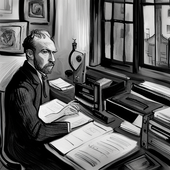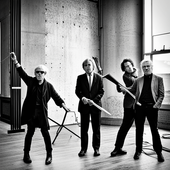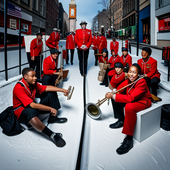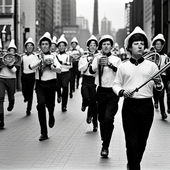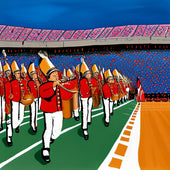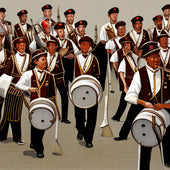Once your fledgling leadership team is selected, now begins the work of developing those students to be the core of the band that you need to have a successful organization that hums along like a well-oiled machine.
There are two phases to your leadership training that you need to consider. First, instill in your students the values of leadership. Second, teach your students all the processes and procedures of your band program that they'll be leading.
When training your leaders, there are several avenues to explore for leadership philosophies. The most obvious is starting from the myriad band/student leadership materials. The gold standard grandaddy of band leadership is Dr. Tim (Lautzenheiser), but there are many other great sources alongside Dr. Tim's materials.
Another great source of leadership philosophy is corporate training. Every mid-level business seeking to "breakthrough" is more than willing to spend obscene sums of money on training mid-level managers to be better at running their departments. The result for us in education is countless books with nuggets of gold that take some panning and sifting. The top of this list includes Stephen Covey's "Seven Habits." Other greats are Simon Sinek's "Start with Why" and James Collins' "Good to Great."
A third undeniable source is the military. Like teaching, the men and women who serve their countries in uniform do the job out of passion, not profit. Jobs like these rely on outstanding leadership to continue motivating all levels of contributors. Like corporate leadership, there is a lot to glean from military leadership training, though it does take a little redirection (just like corporate leadership). One of my favorites is the U.S. Army's "values of a leader," represented by the acronym "LDRSHIP." As you research this topic, it becomes a fun conversation with students that, structured correctly, sets up a grand reveal that'll "wow" your students.
Regardless of which sources of leadership training you start from, these philosophies will guide your students to think more like leaders and then (hopefully!) act as leaders.
The number one roadblock to leadership success that I have seen at every level of the activity is the adults getting upset at kids not doing what they (the adults) want. Every time this happens, I ask if they've explained to the kids what they want, and the answer is always "no."
I learned this lesson myself as a first-year teacher. On my first day of band camp right out of college, I wanted my students to set up a circle to start warm-up. I got so mad because they couldn't do it. A handful of years later, it hit me: they didn't know how to do it because I never explained to them what I wanted. Since then, anytime I have any detail for which my students will be accountable, I always start with defining and demonstrating.
Regardless of the tasks that you will delegate to your student leadership -- loading a truck, setting up the field, managing your music library, distributing band uniforms -- always start with clear and straightforward explanations and remind yourself that you are working with young people who have just recently become teenagers and their prefrontal cortexes have not yet developed. They will eagerly and willingly do everything you ask, but you need to take the time to show them first.
Be a patient and willing guide, and your leaders will be impenetrable walls of defense that protect your band program.
















